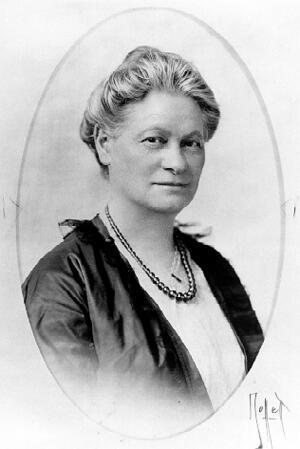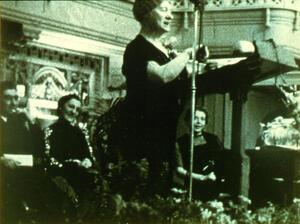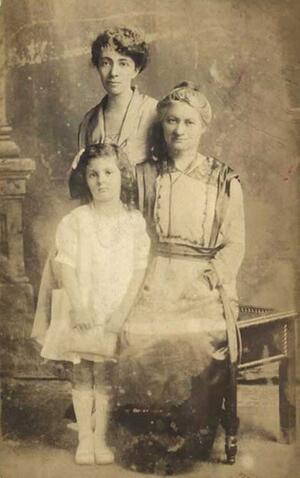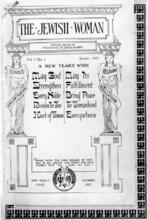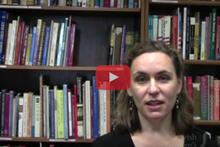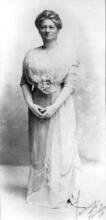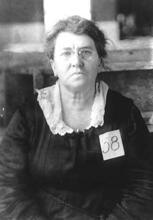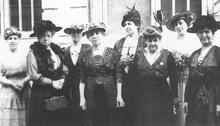Hannah Greenebaum Solomon
When she created the National Council of Jewish Women, Hannah Greenebaum Solomon used the model of an elite Chicago women’s club that had challenged its members intellectually as well as demanded their energy for social causes. Under her leadership, NCJW was committed to both Jewish education for women and engagement in social reform. Solomon spearheaded study circles to fight assimilationist trends and help Jewish women become more involved in Jewish life. She also allied NCJW with Christian and secular groups for women, working together to help children and the poor in Chicago and throughout the country. Devoted to her family, she helped recast the Jewish mother from a quiet angel of the house to a woman who could be deeply committed to her home life and also make important contributions to society.
Hannah Greenebaum Solomon founded and served as the first president of the National Council of Jewish Women (NCJW). Solomon brought both leadership and ideological vision to the NCJW, helping it become the premier Jewish women’s organization of the late nineteenth and early twentieth centuries.
Early Life
The fourth daughter and one of ten children, she was born on January 14, 1858, to Sarah (Spiegel) and Michael Greenebaum, a successful merchant. She attended both temple school and public school, including two years at Chicago’s West Division High School. She also studied piano with Carl Wolfsohn. In 1879, she married Henry Solomon. The couple had three children, Herbert, Helen, and Frank.
National Council of Jewish Women Beginnings
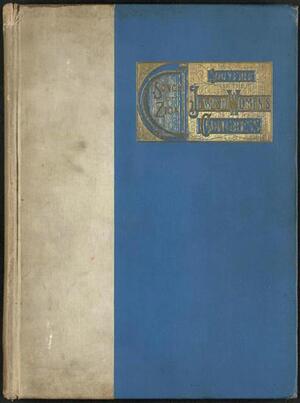
Courtesy of the National Council of Jewish Women Collection, Manuscript Division, U.S. Library of Congress.
Solomon and her sister Henrietta Frank became the first Jewish members of the prestigious Chicago Woman’s Club in 1876. A member of Chicago’s most prominent Reform synagogue, Temple Sinai, Hannah Solomon belonged to a solidly middle-class community with a strong commitment to Jewish life. Already accomplished and well known in secular women’s groups and in the Jewish community, Solomon emerged as an obvious choice to chair the Jewish Women’s Committee when Chicago hosted the 1893 World’s Columbian Exposition. Although Jewish women had originally been expected to hold their meeting in the Woman’s Building, Solomon chose instead to convene Jewish women under the auspices of the World Parliament of Religions at the Exposition. In the course of the four-day Jewish Women’s Congress, a large gathering of Jewish women discussed the multiple possibilities and goals for a national Jewish women’s organization. At the conclusion of the congress, delegates founded the National Council of Jewish Women and unanimously elected Hannah Solomon as president.
At its founding, the NCJW dedicated itself to religious, philanthropic, and educational endeavors. Initially composed of ninety-three members, by 1896, the NCJW had organized local sections in fifty cities and had attracted a membership of over four thousand women; by 1925, over fifty thousand women had joined its ranks. One of the NCJW’s primary objectives was to educate its own members about Judaism. In the late nineteenth century, few Jewish women had access to Jewish education; NCJW sections organized study circles designed to teach Jewish women about the fundamentals of Jewish religion and practice. The women of the NCJW joined their non-Jewish counterparts in supporting the notion that women shouldered responsibility for safeguarding religion in the home and teaching children moral values. Viewing themselves as guardians of Jewish faith, NCJW women attempted to enhance commitment to Judaism through their organization. They also celebrated motherhood as a sacred institution and consistently emphasized the importance of women’s role in perpetuating Judaism within the home.
Hannah Solomon recognized that the founding of a national Jewish women’s organization, the public nature of NCJW programming, and the leadership of women would not be immediately accepted by the Jewish community. Solomon explained that “to join an organization of ‘women’—not ladies—and one which bore the title ‘club’ rather than ‘society,’ was in itself a radical step.” She warned members to be prepared for critics to “mourn over our neglected children, and wonder how our husbands manage without us.” Indeed, Solomon recalled later in her life that in the 1890s she “was considered quite radical” for her public speaking and organizational activity. In the NCJW’s early years, Solomon and other leaders often confounded expectations about proper behavior for a woman. As NCJW president, Solomon was the first woman to speak from several synagogue pulpits throughout the country. More often than not, Solomon and NCJW women justified their public roles as an extension of their duties as wives and mothers. “Woman’s sphere is in the home, they told us. The last thirty years have been devoted to proof of our boast that woman’s sphere is the whole wide world, without limit,” declared Solomon, reflecting in 1920 upon the accomplishments of the NCJW in the American Hebrew. Like other NCJW leaders, Solomon advocated significant alterations in Jewish women’s behavior, but she often masked the nature of that change by underlining the continuity of women’s obligation to home and family.
NCJW and Immigrant Aid
The NCJW pioneered many arenas of Jewish philanthropy and immigrant aid. Its New York section assumed a leading role in aiding new arrivals at Ellis Island and was particularly attentive to the needs of female immigrants.
While New York remained the hub of the NCJW’s immigrant aid programs, Solomon also sponsored an extensive array of immigrant services in the Chicago community. Even before assuming the presidency of the NCJW, Solomon had worked with the Chicago Woman’s Club in several philanthropic endeavors. During her tenure as NCJW president (1893–1905), Solomon founded the Bureau of Personal Service, an agency that served Jewish immigrants in Chicago’s seventh ward. Established in 1896 with funds from the Chicago NCJW section, the bureau provided family counseling, supervised loan programs, worked to improve housing conditions, and directed new immigrants to appropriate social service organizations. Many NCJW members volunteered at the bureau’s agencies, acting as social workers, visiting prisons, and providing instruction in the English language and American mores. Hannah Solomon chaired the Bureau of Personal Service until 1910, when it became part of Chicago’s Associated Jewish Charities, a citywide organization coordinating Jewish philanthropy. Like so many women’s projects, the volunteer programs of the bureau and the NCJW predated the establishment of a coordinated Jewish philanthropic effort in the city. The Associated Jewish Charities was founded in 1900, several years after the bureau and NCJW had pioneered volunteer social service programs. Through her presidency of the NCJW and directorship of the bureau, Solomon established herself as one of the premier community leaders of Chicago. She served for years as the only woman on the executive board of the Associated Jewish Charities. Solomon’s work placed her squarely in the middle of an active social service network that included both Jewish and gentile agencies. She maintained close connections to Jane Addams and Hull House, the Maxwell Street Settlement, and the Chicago Civic Federation.
NCJW and Judaism
Solomon always considered herself a passionate advocate of Judaism and Jewish values. Under her leadership, the Chicago NCJW chapter created a Sabbath school for girls. Solomon and the NCJW considered it particularly important to inculcate Jewish values in young girls and provide them with educational opportunities. The school eventually became so popular that, like so many other ventures initially sponsored by the NCJW, it became absorbed within a larger Jewish institution, adopted by Temple Sinai as part of its regular educational program. In establishing Jewish communal projects as well as building secular organizations, Solomon always considered philanthropy, education, and social service as an extension of religious obligation.
However, Hannah Solomon’s personal definition of Judaism did not always correspond with the Jewish values of other NCJW members and provided a source of conflict within the organization. A committed Reform Jew, Solomon supported a movement within Reform Jewry to move the Saturday Sabbath to Sunday as a means of conforming with American standards and encouraging greater Sabbath observance within the Jewish community. While the NCJW primarily attracted Reform women, many of its members were also Conservative and Orthodox, and even its Reform constituents did not unanimously support the Sunday Sabbath movement. Sabbath observance had been a consistent NCJW goal, and many members actively opposed Solomon’s support of the Sunday Sabbath. At the 1896 convention, a group of women challenged Solomon’s leadership and attempted to remove her from the presidency, citing her endorsement of the Sunday Sabbath. During the contentious debate, Solomon issued her often quoted statement, “I do consecrate the Sabbath. I consecrate every day in the week.” Solomon and her allies managed to keep the opposition from ousting her as president and steered the NCJW toward a pluralistic position that supported Sabbath observance without taking an official position on the Sunday Sabbath issue. However, Solomon’s stance on Sabbath observance remained a source of divisiveness during her tenure as NCJW president.
Other Endeavors and Legacy
In 1905, Solomon declined to be renominated as president of the NCJW, claiming that she was suffering from poor health. However, in that same year she began working with the Illinois Industrial School for Girls, later renamed the Park Ridge School for Girls, which became one of Solomon’s most cherished projects. She continued to hold her positions on the boards of the Associated Jewish Charities, the Chicago Civic Federation, and the Illinois Federation of Women’s Clubs, and to participate as a leader in several other organizations. As a prominent civic reformer and a representative of the Women’s City Club, she investigated problems with Chicago’s waste disposal system. Throughout her career, Solomon was an ardent advocate of woman suffrage, although the NCJW itself never formally endorsed the movement. Also interested in international women’s issues, she served as a delegate to the 1904 International Council of Women conference in Berlin. She visited Palestine in 1923 and, though she never became a Zionist, she did support Palestine as a refuge for Eastern European Jews. In the last years of her life, she wrote her autobiography and several other works that reflect upon her career. She died on December 7, 1942.
Hannah Solomon represented a generation of middle-class Jewish women who paved the road for women’s voice in the public affairs of the Jewish community. A consummate leader and administrator, Solomon made a career out of voluntarism and social reform. In her secular as well as her Jewish activities, Solomon used her commitment to home and motherhood to redefine proper female behavior and reshape the boundaries between the public and private spheres.
AJYB 7 (1905–1906): 103, 45:395.
“American Jewish Women in 1890 and 1920: An Interview with Mrs. Hannah G. Solomon.” American Hebrew, April 23, 1920.
EJ.
Golomb, Deborah Grand. “The 1893 Congress of Jewish Women: Evolution or Revolution in American Jewish Women’s History?” American Jewish History 70 (September 1980): 52–67.
NAW.
Rogow, Faith. Gone to Another Meeting: The National Council of Jewish Women, 1893–1993 (1993).
Sochen, June. Consecrate Every Day: The Public Lives of Jewish American Women, 1880–1980 (1981), 48–61.
Solomon, Hannah. Fabric of My Life (1946), and A Sheaf of Leaves (1911).
UJE.
Wenger, Beth S. “Jewish Women and Voluntarism: Beyond the Myth of Enablers.” American Jewish History 79 (Autumn 1989): 16–36.
WWIAJ.

